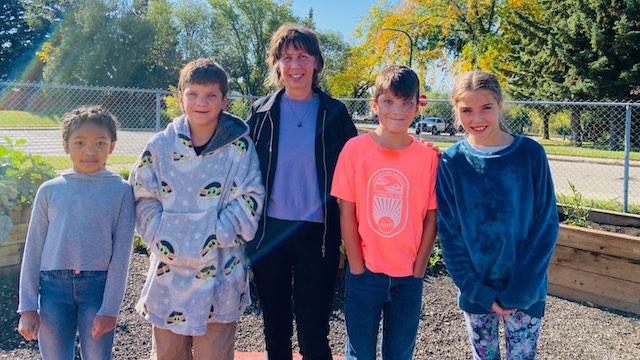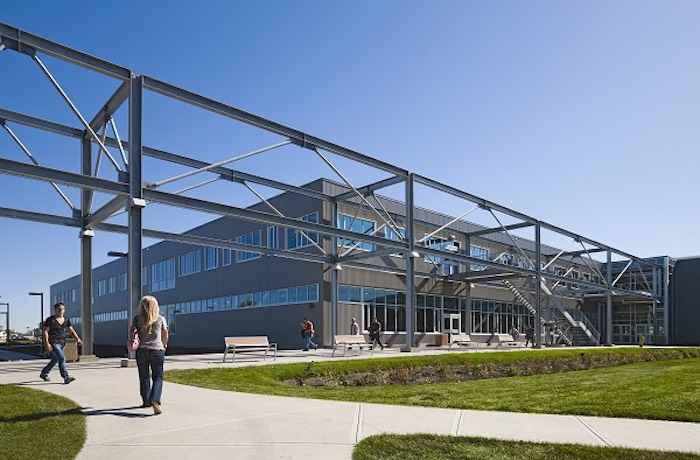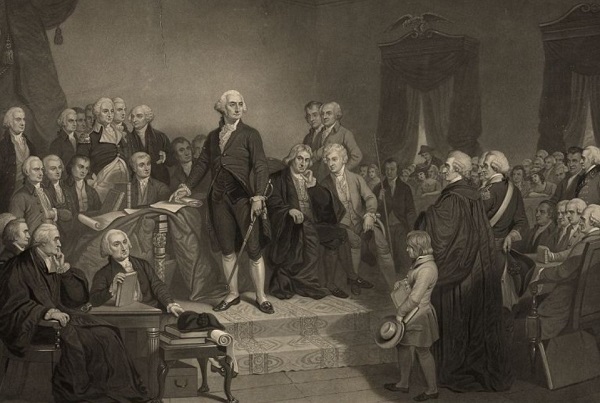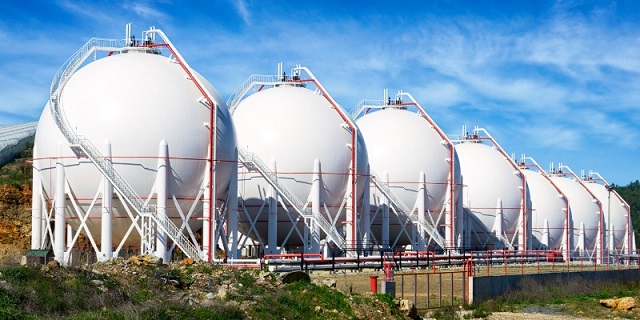Education
Recently retired longtime teacher receives national recognition

Melanie Beebe stands with students in the outdoor gardens at École Oriole Park Elementary
A recently retired teacher at École Oriole Park Elementary has been recognized at a national level for her excellence in teaching.
Melanie Beebe has received a Regional Certificate of Achievement from the Prime Minister’s Awards for Teaching Excellence in STEM. She was nominated by the school’s Principal Lori Irvine.
“It’s an absolute honour to be recognized,” said Melanie. “Many names belong on this award. I have to give many people credit for this award because I couldn’t have done it alone and without the support I had from admin, my colleagues, parents, students, and the community.”
Melanie, who retired last June, began her teaching career in 1992 in Edmonton before spending the last 13 years in Red Deer Public Schools. “I’ve worked with some incredible teams throughout my career who have created some rich learning environments for students,” she said.
Teaching was always something she knew she wanted to do after having experiences in the educational system following the completion of her Bachelor of Science in Psychology Degree.
“I have always loved kids. I love their energy, and I love that they just give,” said Melanie. “Something that was really important to me was to create a classroom that was safe and caring where students felt that I loved them.”
She said she was fortunate enough to spend many years of her career in a French Immersion setting.
“Giving kids the opportunity to learn a second language is a gift. It opens your mind to learning a whole new language and a new culture,” she said. “French Immersion is challenging as it adds a layer in education, but students learn to problem solve and to work as a team, so I think it adds a good layer. It gives them a gift at the end of their school career in that they can converse in a second language.”
Some highlights of Melanie’s career include the Rethink Red Deer Capstone Educational Program which saw students plant and harvest vegetables at the Capstone Gardens beginning in the spring of 2022.
“I think giving kids opportunities and experiences to do different things really helps them grow and learn,” she said. “I saw this as a really exciting opportunity outside of the classroom and it was something that was hands-on. I saw a real difference in my classroom when we started the gardening project. My classroom changed and the kids became really cohesive and became a team.”
The project received national recognition in that Melanie and her class won the Canadian Geographic Queen’s Jubilee Classroom Challenge grand prize for their community involvement in gardening and native plant research.
“All of these successes came about through teamwork and collaboration,” she said. “The food that we helped grow was donated to the Red Deer Food Bank and Mustard Seed. It was an adventure in global citizenship and community involvement.”
She was also instrumental in bringing the Northern Coding Academy to Oriole Park. The program, funded by the Government of Canada’s CanCode program and administered out of the Telus World of Science in Edmonton, saw online instructors guide students in a 10 week coding school.
“It was an incredible technology learning experience for all of my Grade 5 students and for myself. This project incorporated the Social Studies Canadian history curriculum, French Language Arts, English Language Arts and Math,” said Melanie. “Students learned to code video games with Makecode Arcade about historical figures and moments in Canadian history.”
For Lori, she said nominating Melanie for the prestigious award was a no-brainer.
“When a teacher steps up and goes that extra mile and looks for opportunities to connect students to the community like Melanie did through the Capstone Garden Project, and when you have a group of students who you want to do right by each and every day, that is what Melanie does, and that is deserving of recognition,” she said. “She ran a very respectful and rigorous classroom and taught her students first and foremost to be good human beings. Academics are very important, but Melanie wanted to ensure her students were good people in society, too.”
Education
Schools shouldn’t sacrifice student performance to vague notions of ‘equity’

From the Fraser Institute
According to a new study published by the Fraser Institute, if Canada wants to remain competitive with emerging economies around the world, we must increase our math, science and reading scores—and not simply pursue high levels of “equity and inclusion” as the primary goal for our schools.
Indeed, highly equitable and inclusive schools—with declining PISA scores, as is currently the case in Canada—do a disservice to students and society at large.
Why? Because higher test scores translate into greater “knowledge capital”—that is, the full body of knowledge available to an economy—and boost economic growth (and, incidentally, the tax revenues that fund our schools).
Indeed, the goal should be equitable access to a quality education. And the most realistic and meaningful way to measure student progress is through PISA tests, which every three years assess the performance of 15-year-olds worldwide in core subjects of math, science and reading rather than the limited curriculum objectives used in provincial testing, which can only show progress or decline within individual school systems. In today’s world, where competition is truly global, we must know how our students and schools perform compared to their peers in other countries, especially the “Asian Tigers” of Hong Kong, Korea, Singapore and Tiawan whose rapidly growing economies have been driven by rising PISA scores.
Obviously, countries with higher test scores can teach other countries how to improve—although there are limits and some traps here. Attempting to cut and paste Singapore’s or Korea’s much more meritocratic systems of highly competitive student assessment and selection would be impractical and impolitic in Canada. Even so, policymakers should consider reinstating more meaningful meritocratic norms in Canadian schools to encourage and recognize academic achievement. Nothing succeeds like success, except recognized and rewarded success.
Closer to home, other provinces could benefit from considering why Quebec is such a stellar performer in math and why Alberta has the highest overall PISA test score average of all provinces.
But fair warning, recent attempts at school improvement in Canada show that top-down one-size-fits-all changes—including extending compulsory attendance, reducing average class size and tinkering with course content—have had little positive effect on student performance, although they may please teacher unions. If policymakers want to achieve more equitable success for more students, they should introduce more flexibility, school autonomy and choice into our top-heavy centrally regulated school systems. In this respect it may be no accident that the three highest performing, mid-spending provincial K-12 education systems (Alberta, Quebec and Ontario) offer relatively high levels of school choice, although of quite different kinds.
Equity and inclusion are noble goals, but they shouldn’t interfere with student progress. There’s too much at stake, for students and the country.
Author:
Alberta
Expansion planned for Centre for Innovation in Manufacturing at Red Deer Polytechnic

Investing in innovation at Red Deer Polytechnic |
Alberta’s government is expanding student capacity and creating a modern learning environment at Red Deer Polytechnic that will help graduates succeed in the economy of tomorrow.
To support emerging opportunities for students, Alberta’s government will invest $12.9 million to expand the Centre for Innovation in Manufacturing Technology Access Centre (CIM-TAC) at Red Deer Polytechnic (RDP). CIM-TAC is an applied research and innovation centre that gives companies access to state-of-the-art prototyping and manufacturing equipment, along with a multi-disciplinary team with the expertise to turn brilliant ideas into market-ready products.
As Alberta’s economy grows and diversifies, job creators will increasingly seek employees with the skills required to work in advanced manufacturing.
Construction will begin in early 2025 and will increase the centre’s applied research, education and training capacity. The expanded CIM-TAC will grow to provide work-integrated learning opportunities for an estimated 450 post-secondary students and training through workshops and events to an additional 2,000 students annually by 2030. Additionally, more than 500 junior and senior high school students will take part in dual credit programs at the CIM-TAC.
“Investing in this expansion of CIM-TAC will give students at RDP access to cutting-edge technology and skills to succeed in the economy of tomorrow. The strategic investments we’re making in Budget 2024 are part of a forward-looking path to support the goals of our post-secondary institutions, grow Alberta’s economy and create jobs.”
“The expansion will allow Alberta-based manufacturers across multiple sectors to have greater ability to develop, test and scale their ideas. Students will be engaged at the forefront of made-in-Alberta technologies and manufacturing solutions.This investment will help meet high demand from entrepreneurs and industry for applied research and will take the facility beyond its current capabilities to become an advanced technology training and hands-on learning centre.”
“This expansion project will build on the CIM-TAC’s 15 years of success and leverage the centre’s industry partnerships and manufacturing expertise to provide even more capacity for applied research, as well as education, training and work-integrated learning opportunities for students. We thank the Government of Alberta for this investment that will benefit not only RDP students and researchers, but also the entire central Alberta region and its critical industries like health care, agriculture, energy and construction.”
“Manufacturing and advanced manufacturing are driving job-creation, economic growth and made-in-Alberta solutions that improve the lives of people around the world and right here at home. The funding to expand RDP’s CIM-TAC is an investment that will allow Alberta companies greater access to the tools, technology and next generation of skilled talent that will allow our industry to solve real-world challenges, develop better products and ultimately increase productivity.”
Quick facts
- The expansion of CIM-TAC at RDP will support a variety of sectors through advanced manufacturing capabilities, including energy innovation, transportation, aviation and agriculture. The centre will also support RDP’s future expansion into more medical device manufacturing and health-care innovations to support both patients and providers.
- RDP’s expansion of the CIM-TAC will grow the facility’s footprint from 15,000 square feet to 25,000 square feet.
- The CIM-TAC currently houses $7.6 million of advanced manufacturing equipment.
- In 2022, RDP attracted more than $2 million in applied research investment. RDP also completed 64 projects for 57 companies and participated in more than 1,300 engagements with industry partners.
- Since the CIM-TAC’s inception in 2009, RDP has supported more than 300 industry partners (including repeat clients).
-

 Education2 days ago
Education2 days agoSchools shouldn’t sacrifice student performance to vague notions of ‘equity’
-

 Opinion2 days ago
Opinion2 days agoBoy Scouts of America changes name to ‘Scouting America’ to be ‘more inclusive’
-

 Brownstone Institute1 day ago
Brownstone Institute1 day agoMedical Elites’ Disgrace Over Ivermectin
-

 Opinion1 day ago
Opinion1 day agoThe American Experiment Has Gone Down In Flames
-

 COVID-191 day ago
COVID-191 day agoThe New York Times Admits Injuries from COVID-19 Shots
-

 conflict1 day ago
conflict1 day ago‘It Makes No Sense’: Experts Puzzled By Biden Admin’s Claim That Rafah Invasion Wouldn’t Help Israel Defeat Hamas
-

 Energy23 hours ago
Energy23 hours agoFederal government continues to reject golden opportunities to export LNG
-

 Bruce Dowbiggin22 hours ago
Bruce Dowbiggin22 hours agoWhy Do The Same Few Always Get The Best Sports Scoops?






